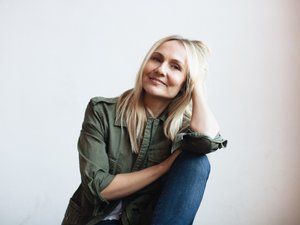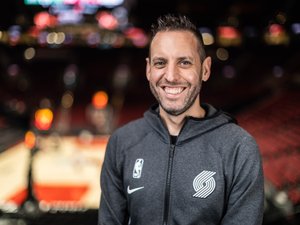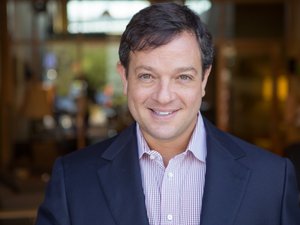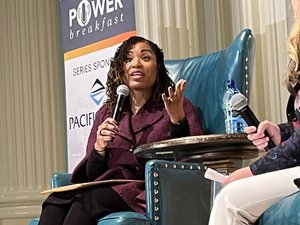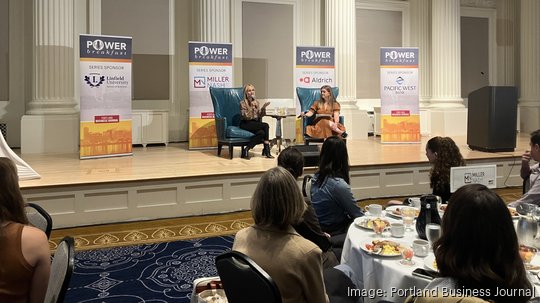
Sadie Lincoln is co-founder and CEO of Portland-based fitness company Barre3.
She started the company in 2008 after spending 11 years at 24 Hour Fitness helping to take that company from upstart to global fitness chain. That experience shaped the way Lincoln would build Barre3, but not in the way you might think.
Barre3 has more than 180 studios globally and they are all owned by women. Plus it has online workout subscribers in 156 countries.
“It's not just about scale. Every single one of those (studio) numbers is a woman who sat in her dining room with her partner, her kids, maybe her parents, and debated am I going to put my life savings into this concept. Every single one of those numbers represents that, and then the build out and the training and the leadership and the commitment to her community,” Lincoln said.
“I think that's a practice maybe all of us can adopt as we grow companies, instead of growing numbers, we grow people.”
Lincoln was the guest of the Business Journal's September Power Breakfast. Here are excerpts from her conversation with PBJ Publisher Candace Beeke. This interview has been edited for length and clarity.
Where did you grow up and what were you like as a kid? I was born in Taos, New Mexico. But I grew up basically in Eugene, Oregon. My family was a little unique because my mom and her best friends met in Taos, and they were single moms and they decided to raise us kids collaboratively. We all moved from Taos. So, there was four women, and then the fifth came along in Eugene, and kind of created their own community village, if you will. It wasn't a commune. My mom always wants me to say that on stages. She's like, “Well, we were like intellectual country hippies. You can say that.” I was raised by five women. My mom is truly my mom, but I had these other women that cared about me, and then their children are my siblings. As a kid, I was super normal. I was a cheerleader, and I wanted to be normal. I didn't want to have a hippie family.
What about that unique upbringing helped shape you as a leader? Well, according to my therapist, you either react or you reenact from your environment. So I've done both. And in therapy I realized I recreated my family on accident, like it was a subconscious act. But one of the things we used to do as a family, for example, is we always sat in a circle. And it was time for facilitated conversation and a catalyst for self awareness. But there's this real connection, everybody's seen and heard. And every single instructor training, I make everybody sit on the floor, we sit in a circle, we do connect and there is this real culture within Barre3 of being seen and heard. And even the ballet bar wraps around the room like a circle where we are shoulder to shoulder at the ballet bar. So yeah, there are no accidents. My whole company is run by women 100% owned and operated by women. And we have over 180 Studios now and they're all owned and operated by women.
Do you think anything in your upbringing helped you have the confidence to become an entrepreneur? Yes, and my brother (Miguel Mckelvey, co-founder of WeWork) is also an entrepreneur. We’ve had this conversation a lot. I think, number one, and this is so good for me to remember as a parent, is my family celebrated mediocracy. Like there was zero pressure to succeed, externally. It was really about being honest, showing up honest and following your passion. And that's what these women did. They dropped out of mainstream society. They were a kind of counterculture, trying to figure out how do we live a life that's more congruent with our values, versus what the system is telling us to do. Any entrepreneur probably sees themselves in that most of us are counterculture, like we figured out, we're going to scratch our itch, and do something different because (the system is) not working.
You were part of the team that helped 24 Hour Fitness go from 25 gyms to over 430 gyms globally over a decade. What were some of the lessons you learned that transferred to Barre3? The most powerful lesson for me was inside that no one could see. How we sold fitness (at 24 Hour Fitness), was we had pictures of this woman before, pretty degrading, and after. So buy the membership and you too can be the after picture. That totally hooked me. I'm a high performer. Like all of you, I want to belong. I want to be attractive, I want to be winning, I want to be successful. And I started to believe this false narrative that that was my ticket. ... (And yet) I had tremendous shame. I had an eating disorder. I had feelings of low self worth. It was so confusing, because I'm like, “wait, we're crushing it.” And I felt worse and worse and worse and my body started to hurt.
What changed? It wasn't until I had an “aha” when I was pregnant with my first child. And I went back inside to the inner landscape of my body ... and how I felt every morning waking up with a growing child inside of me that I had one of those lightning bolt moments where I realized I should not have personal shame around this fitness industry thing. I am not broken, the fitness industry is broken. How we're selling, and designing fitness is wrong. It is not helping people, I'm not alone. So what I learned at 24 Hour Fitness is I didn't want to sell (fitness) that way. And I also didn't want to design (fitness) that way.
